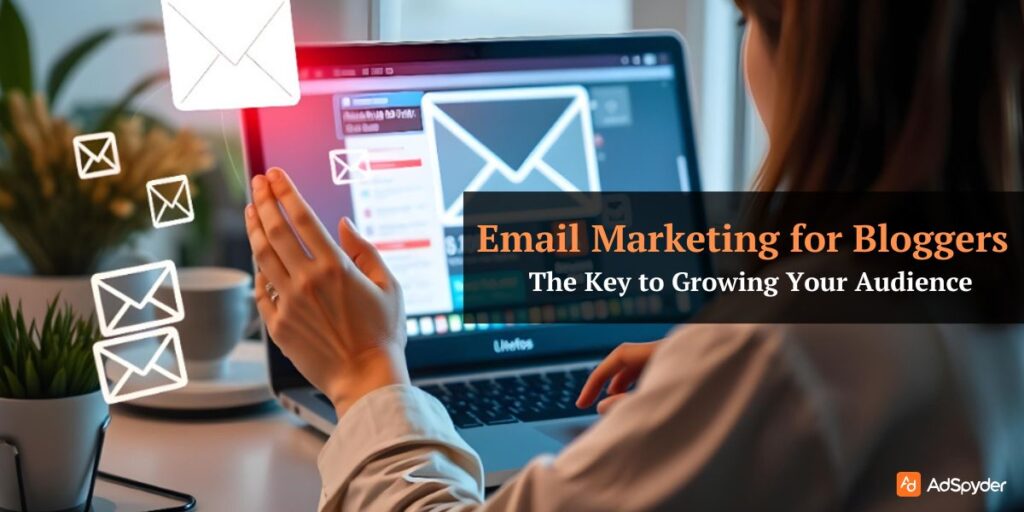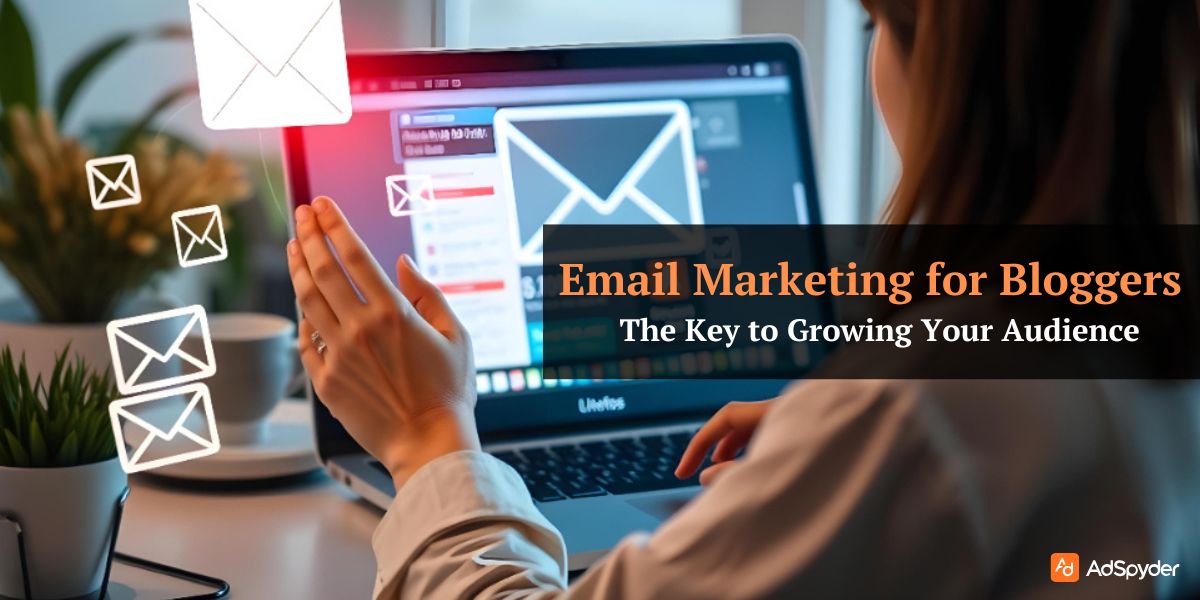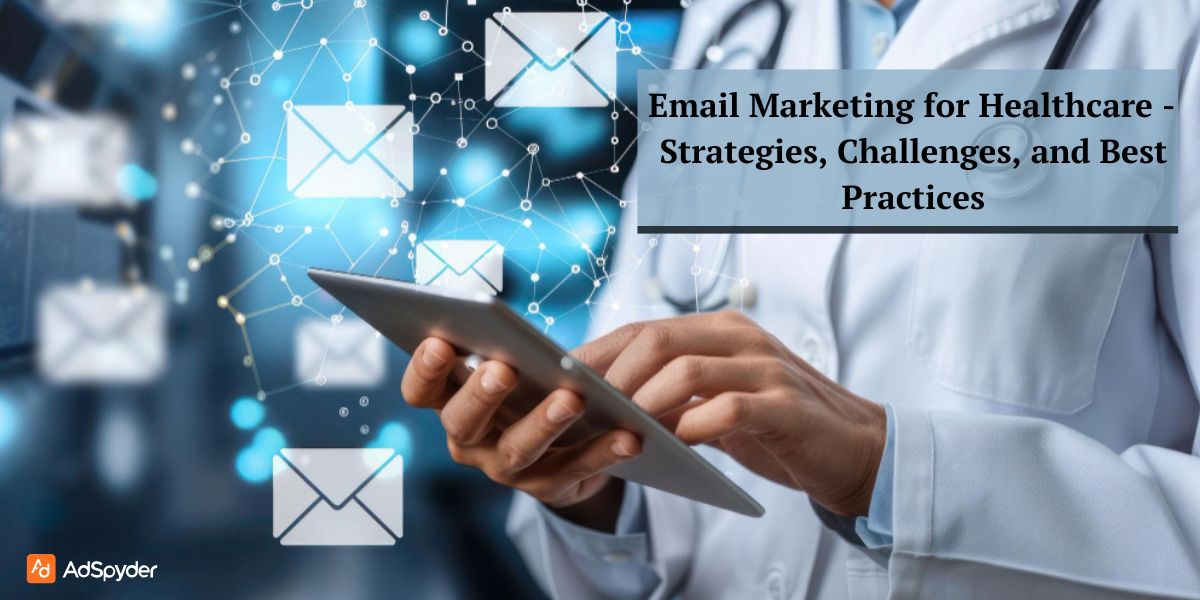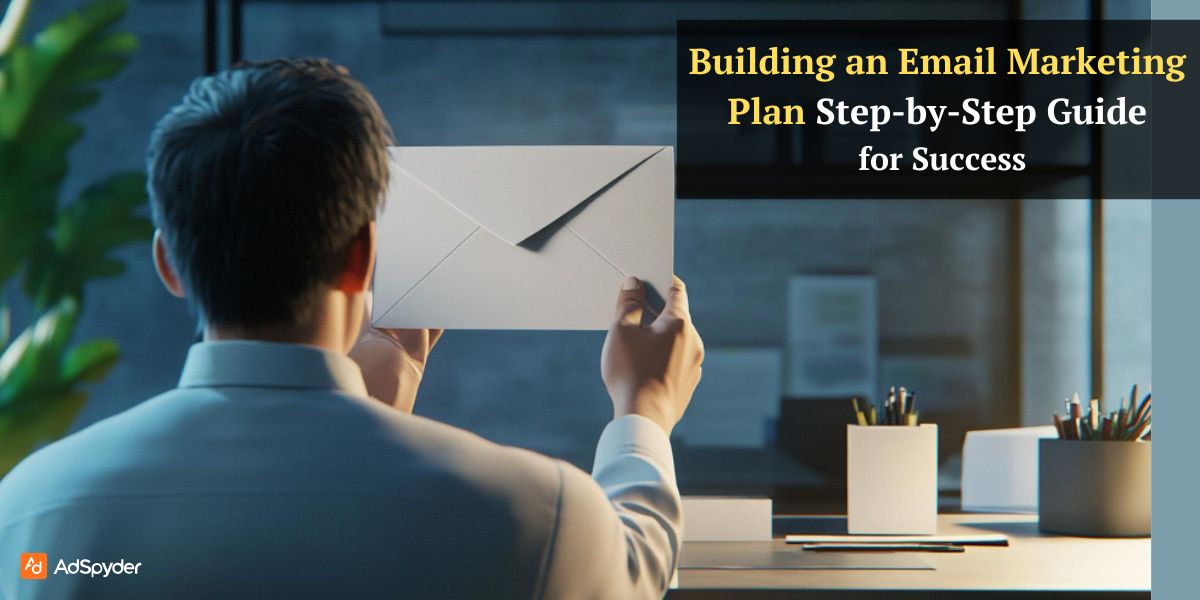In the digital landscape, where social media algorithms frequently change, email marketing remains a consistent and powerful tool for bloggers. Email provides direct communication with your audience with either informative or creative content, unlike social media where audiences see millions of posts and the chances of your post easily getting lost is high. This blog will explore the essential elements of email marketing for bloggers, detailing how it can drive traffic, enhance engagement, and create monetization opportunities for the ever-evolving digital space.
Ready to Elevate your Marketing Strategy?
Why Bloggers Should Use Email Marketing

Email marketing can be a great way to reach to your users with new offers, details, updates, etc. These users can become a loyal customer for you.
Building a Loyal Audience
Email marketing helps establish a loyal audience by creating a personal connection with readers. Users who are genuinely interested and have opted to receive emails related to your niche. This voluntary engagement leads to a more dedicated following, as email allows you to communicate directly with readers without interference from algorithms.
Driving Traffic to Blog Content
Emails can significantly increase traffic to your blog. By regularly updating subscribers about new posts, you can direct them back to your website. A well-crafted email can entice readers with snippets of your content, encouraging them to click through for more. For example, a weekly newsletter summarizing recent posts with engaging subject lines can lead to higher click-through rates.
Check Out: Email Marketing for Health Care
Monetization Opportunities
Email marketing can be a lucrative channel for monetization. Bloggers can leverage their email lists to promote affiliate products, sell their products, or even secure sponsored content. Bloggers should always aim for value through well-targeted promotions, this can turn their email lists into a source of revenue and boost their income.
Building a Personal Brand
Consistency plays a very essential role in every field whether it be any marketing promotions or personal likes, likewise, it fosters a strong personal brand through email communication. By sharing your unique voice, insights, and experiences, you can build trust and authority in your niche. Subscribers who feel connected to you are more likely to engage with your content and support your endeavours, whether through purchasing products or sharing your blog with others.
Types of Emails Bloggers Can Send in Email Marketing

Welcome Emails
The welcome email is crucial as you must have heard that first impression always puts a lasting image. This email should introduce new subscribers to your blog, outline what they can expect, and encourage them to engage with your content. A friendly tone, a brief background about yourself, and links to popular blog posts can set the stage for a positive relationship.
Weekly or Monthly Newsletters
Regular newsletters allow your audience to stay updated with all your latest content and other relevant information. A well-designed newsletter can include blog summaries, tips, personal anecdotes, and links to recent posts, providing subscribers with valuable content while driving traffic back to your site. A well-structured and creative email content whether it be the subject line or the body of the content enhances audience engagement.
Content Promotions
When you have a new blog post or a significant update, sending a content promotion email can generate immediate traffic. Grab the audience’s attention by focusing on key points from the post and include a compelling call-to-action (CTA) to encourage readers to click through to your blog. Always highlight the points that are creative yet at the same time give value-added information to your users.
Lead Magnets and Freebies
Offering lead magnets, such as eBooks, checklists, or templates, can incentivize sign-ups to your email list. These resources should provide genuine value, aligning with your blog’s niche and catering to your audience’s interests. For example, a food blogger might offer a free meal planning guide or give away his products in exchange for email sign-ups.
3.5 Exclusive Offers and Discounts
If you sell products, sending exclusive offers or discounts to your email list can enhance subscriber loyalty. Special promotions for subscribers can create a sense of exclusivity, encouraging more conversions and deeper engagement with your brand.
Building an Email List for Email Marketing for Bloggers

Importance of an Email List
Starting with email marketing the important and most important thing you require is the email data or list, so bloggers must have their preferred email list depending upon their targeted audience, demographics etc. While social media followers are valuable, an email list gives you more control over your audience. With an email list, you can communicate directly with your subscribers without relying on algorithms. This direct access ensures your messages reach the intended audience.
Opt-in Strategies
To effectively grow your email list, implement various opt-in strategies to get your user’s emails easily. Consider using pop-up forms, embedded signup forms, or dedicated landing pages. The key to getting more signups is to create an appealing and easy signup process. Use whatever means that are available like social media and Google ads to promote your newsletter and encourage the audience to sign up.
Offering Value with Lead Magnets
Creating high-value lead magnets is essential for attracting subscribers. A lead magnet should address a specific problem or need of your target audience. For instance, if you run a travel blog, a free packing checklist, a travel budget planner or an essential-to-pack-for travel guide can entice visitors to join your email list.
Best Practices for Effective Email Marketing for Bloggers
Segmenting Your List
Segmentation of your email lists allows you to distinguish each email into a group based on similar interests, age or demographics in a structured manner. By segmenting your list, you can send tailored content that resonates with each group that caters to each individual’s problem in a better way. For example, a parenting blog could segment its audience into categories like newborns, toddlers, and school-aged children, ensuring each group receives relevant content as they have different problems after all.
Writing Compelling Subject Lines
The Subject line plays a pivotal role in deciding if you are doing it right or not as marks your email’s first impression; it can make or break your open rates. Create Compelling subject lines that drive the audience crazy to open. Keep them to the point, short and relevant to the email content. A/B testing can help you decide which subject line is more effective and if the open rates are less then there is a need to work on the subject line by trying out variations.
Engaging Content
Research and brainstorm your ideas to create content that is interesting, and informative as well as provides value to your subscribers. Whether it’s a blog summary, tips, or personal stories, ensure that your emails are engaging and informative. Avoid too sophisticated vocabulary or language that is difficult to understand instead focus on fostering good relationships and connecting through valuable content.
Mobile Optimization
Nowadays as mobile users are more and people prefer doing anything in seconds on their finger it’s necessary to make sure your content is mobile optimized. All the content created should be rechecked in a mobile format to make sure it looks exactly similar to what it will be on the desktop. Design your emails ensuring they display correctly on all devices. Short paragraphs, large fonts, and clear CTAs can enhance mobile usability and improve engagement.
Related: Building an Email Marketing Plan
Timing and Frequency
Try sending emails on different timelines and decide which has proven to be more responsive depending on it set your frequency of sending email. Experiment with sending emails at different time intervals and then closely look into your analytics to identify when your audience is most active or responsive and adjust your email-sending schedule accordingly. Avoid overwhelming your subscribers; schedule your emails on a weekly or bi-weekly basis, maintaining consistency can help in engagement without causing fatigue.
Email Marketing Tools for Bloggers
To help you better your performance through email marketing and use it at its full potential there are various email marketing tools available that cater to bloggers, offering many features to manage your email list:
Mailchimp

Mailchimp is a widely used email marketing platform that is best for people who are just getting started with email marketing. It offers a user-friendly interface and templates that can be tailored according to your audience’s preferences and interests. You can also automate things to save your time and energy and create segmented lists, send targeted campaigns, and track performance through comprehensive analytics.
ConvertKit

ConvertKit is tailored for creators and bloggers, emphasizing simplicity and automation. It allows you to create customizable email sequences, making it easy to nurture subscribers over time. It always has features like landing pages, and tag suggestions that help segment your audience effectively thus making it more feasible to send emails to targeted segments.
Check Out: Email Marketing for Restaurants
AWeber

AWeber is known for its user-friendly interface and strong customer support. It provides various templates, autoresponders, drag-and-drop builders and analytics to track your email campaigns. AWeber is particularly suitable for bloggers looking for a straightforward solution. If you are looking for something with good features and 24X7 customer support this will be the best possible option for you.
ActiveCampaign

Active Campaign is a more advanced option for bloggers looking to implement complex automation and segmentation in their email campaigns. It provides features like CRM integration, customer tracking, in-depth reporting, and many other features. It is the best tool for all bloggers who are fully acquainted with email marketing and are ready to take their business to the next level with it. Ideal for bloggers looking for the most advanced version to enhance their performance. Now from these options you can choose which suits your needs best.
Monetizing Your Email List
Affiliate Marketing
Email marketing provides an excellent platform for affiliate marketing. Bloggers can promote products and services relevant to their audience by incorporating affiliate links in their emails. For example, if a tech blogger shares his reviews of gadgets he can tag along affiliate links while promoting his informative blog, earning commissions on sales generated through that particular link. As the sales driven through their recommendations will be counted on their account. Maintain transparency by conveying your customers of affiliate relationships this will help you gain your audience’s trust.
Product Launches
If you create your products, such as eBooks, online courses, or merchandise, your email list is a valuable asset for promotion. Use email to build anticipation before a launch with teasers, sneak peeks, and exclusive pre-launch offers. Integrating countdown timers in your emails can create urgency, encouraging subscribers to take action as soon as the product is available on the website. Make sure it is easy to understand and CTA is visible.
Sponsored Emails
Another monetization avenue is sponsored content. Brands often look to reach engaged audiences through bloggers. By offering sponsored emails to companies that align with your niche, you can generate additional income. Ensure that sponsored content is clearly marked and provides value to your readers to maintain credibility.
Measuring Email Marketing Success
To ensure your email marketing efforts are effective, it’s vital to track key performance metrics.
Open Rates and Click-Through Rates
As the word suggests open rates mean how many subscribers have after receiving your mail in their mailbox opened your email, whereas click-through rates indicate how many of them clicked on the links within the email. A high open rate means your subject lines are effective, and bring curiosity to your subscribers which compels them to open the mail while a high CTR indicates that your content is engaging. Aim for a standard open rate of at least 20-30% and a CTR of approximately 2 or 4%, but remember that these figures can vary by industry.
Conversion Rates
CR is known as conversion rates and it measures the percentage of subscribers who initiated in making a purchase filled out any survey or signed up for a webinar. Track these rates to understand how well your emails are performing and driving the desired results. Using A/B testing means trying all the possible ways to optimize email content to get enhanced results whether it be through CTAs or layouts.
Visit Here: Email Marketing for Small Businesses
List Growth Rate
Keeping track of your list growth rate helps you understand how quickly your email list is expanding. Calculate this by taking the number of new subscribers and subtracting the number of unsubscribes over a specific period it can be either a week or a month. Aim for steady growth to ensure you’re reaching new readers while retaining existing ones.
Common Mistakes to Avoid in Email Marketing
You need to take care of some various challenges and things while promoting through email marketing to maximize your marketing efforts.
Over-promoting
While promoting products or services is important, overdoing it can alienate your audience. Balance promotional content with valuable information that enriches the reader’s experience. Strive for a mix of educational, entertaining, and promotional content in your emails.
Ignoring List Segmentation
If your email list is not segmented well enough, it can lead to loss. Unrelevant content might be sent to subscribers that might be of other segments’ interest, resulting in lower engagement and higher unsubscribe rates. Invest time in segmenting your list based on interests, behaviours, or demographics to deliver more personalised content.
Not Optimizing for Mobile
With many users checking emails on mobile devices, make sure your email content is well-optimized and mobile-friendly. Keep your content short which compels your audience to give a response. Test emails on different devices before sending them to check if the content alignment is similar to the desktop display, and thus guarantee optimal presentation.
Inconsistent Email Frequency
Finding the right email frequency is key. Too many emails can lead to subscriber fatigue, while too few may cause readers to forget about you. Be consistent while scheduling emails to keep your audience engaged without overwhelming them or overflooding their mailbox.
Case Studies
Gretchen Rubin (The Happiness Project)
Gretchen Rubin, an author and happiness expert, effectively uses her email list to engage her audience. She uses email marketing every week by sending them newsletters filled with insights, book recommendations, and personal anecdotes related to happiness and well-being. Her use of a lead magnet, such as a free guide on habits to stay disciplined and lead a happy life, has helped her grow her list significantly. She promotes her books and courses through emails thus utilizing email marketing strategy at its full potential which is generating revenue for her.
Pat Flynn (Smart Passive Income)
Pat Flynn, a well-known entrepreneur and podcaster, has mastered email marketing to foster a strong community. He offers a free email course to help audiences who are new to podcasts. This is to guide them. It is called “How to Start a Podcast.” It serves as a lead magnet to attract subscribers interested in similar types of content and strategy. Flynn sends regular newsletters packed with valuable tips, resources, and updates about his latest projects. He often shares success stories from his audience, fostering engagement and community spirit while promoting his affiliate products and online courses.
Melyssa Griffin (MelyssaGriffin.com)
Melyssa Griffin, a blogger focused on helping others build their online businesses, uses email marketing to connect with her audience. She offers free resources like an e-library that includes worksheets and guides, encouraging sign-ups.
She promotes her courses and workshops through regular newsletters that contain tips, personal stories and links. Her emails stand out as she focuses more on creative content that is visually appealing and provides value. This contributes to her successful product launches. They significantly enhance her affiliate marketing efforts.
Check Out – Bulk Email Advertising
FAQs
Email marketing adds more value. It enhances bloggers’ income sources by helping them get a loyal audience. They drive traffic to their blogs, and create more monetization opportunities.
There are various types of emails that bloggers can send. They should try sending welcome emails, and newsletters. Further to enhance reach, they can try content promotions, lead magnets, and exclusive offers. These different types of emails are the most effective when it comes to generating revenue through email marketing.
An email list collection of email addresses gathered through various means from individuals, ones who have opted to receive emails, offers or additional information from you or your business. To build an email list you can use opt-in strategies like pop-ups, sign-up forms, and lead magnets to attract subscribers.
Mailchimp, Convertkit, and ActiveCampaign are some of the most widely used tools that offer various features.
Track and analyze metrics like open rates, click-through rates, conversion rates, bounce rates, unsubscribe rates and list growth rates. These decide the success and work on aligning and providing valuable content by refining your strategy.
Avoid email fatigue by regularly overflooding subscribers’ email boxes. Make sure you are optimizing it according to mobile. Painting consistency in sending emails either weekly or bi-weekly is key.
Use affiliate marketing, promote your products, and offer sponsored content to generate income from your emails.
Conclusion
Email marketing is an effective strategy for bloggers to grow a loyal audience, increase website traffic, and monetize their content. Plan and strategies your email marketing efforts by segmenting your list. Craft engaging content, and measure success through key metrics. With this, you can enhance your email marketing efforts.
As you embark on your email marketing journey, remember that building a meaningful connection with your audience is essential. Invest time in research and analysis to target the desired audience. Understand their needs and preferences. You’ll create a thriving email community that supports your blogging endeavours.




